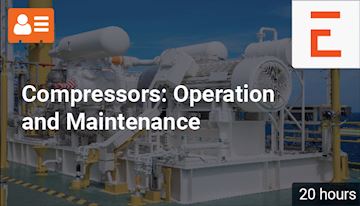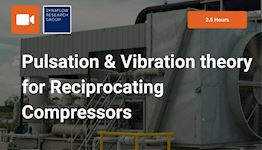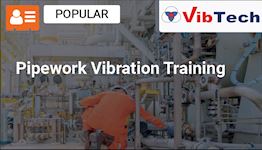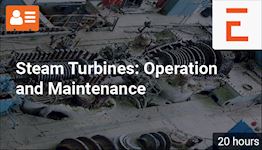Compressors: Operation and Maintenance
Compressors: Operation and Maintenance
-
Unlimited Team-wide Access
-
Advance Technical Competences
-
Courses by Industry Authorities
Additional
Quotation for your TeamAbout the course
Various types of compressors are found on an industrial plant; centrifugal, reciprocating, screw and axial compressors. This instructor led training course shows the participants each of these types of compressor, explaining to them the key components, how the compressor works, maintenance, operation and troubleshooting.
The centrifugal compressor is the subject of the first courses, and topics such as removing the casing, types of impellers, balancing, and wet and dry sealing are covered. Reciprocating compressors are then explained, with valve maintenance, clearance pockets and cylinder clearance being among the topics. Screw compressors, both dry and flooded, are then explained. The component and performance of axial compressors are subsequently detailed together with anti-surge control. Maintenance is a key focus in the explanation of all the compressors.
Performance monitoring and troubleshooting for all these types of compressors are explained. Signal processing and frequency analysis are introduced, and it is shown how measurements can be used to troubleshoot for misalignment, unbalance and clearance problems.
The course is formed of 10 modules split across 20 training hours. All modules will be live sessions with the instructor. This training course is available as a company in-house training only; there is a choice between an online training or an onsite training. All training materials will be available through your EngineeringTrainer account.
Meet your instructor
Instructor
Dimitris Antoniadis
Power Plant Maintenance Manager

Learning Outcomes
After this course, you...• can identify all industrial types of compressors, and understand the selection procedures to match application demand to the machine specific characteristics,
• are able to read and analyze the operating curves of centrifugal, axial, screw and reciprocating compressors,
• recognize the importance of proper alignment and balancing, and know how to analyze the compressor vibration signatures,
• understand how to troubleshoot and analyze root causes of problems, for early detection of failures and for applying wear compensation techniques,
• can identify all individual compressor components and their functional role,
• know the proper maintenance procedures used for compressor, its antisurge protection system and how the lube oil system works,
• have seen the types of seals and their API classification.
Who should attend this course
Those who will be, or have relatively recently started being, involved in the operation and maintenance of compressors at Power Plants, Oil/Gas Production fields, and Petrochemicals and Process plants:• Rotating equipment, machinery, plant, maintenance and mechanical engineers
• Supervisors
• Foremen
• Other technical staff
• Experienced specialists, project engineers and supervisory personnel involved in the management, selection, operation and maintenance of compressors
Prerequisites
Engineering B.Sc diploma or equivalent, or 5 years practical experience with CompressorsProgram & Details
-
Introduction to compressors
Live
1. Types of Compressors, Centrifugal, Reciprocating, Rotary
2. Compressor Selection
3. Casing Types
4. Introduction to Seals and Bearings
5. Introduction to Performance and Control -
Centrifugal Compressor Components
Live
1. Compressor Casing; Vertical and Horizontal Split
2. Diaphragms
3. Inducer and Diffuser
4. Guide Vanes
5. Compressor Rotor
6. Centrifugal Compressor Stage
7. Balance Piston/Drum
8. Axial Thrust and Impeller Arrangements -
Centrifugal Compressor Seals
Live
1. Liquid Film Shaft Seals
2. Dry Carbon Ring Shaft Seals
3. Labyrinth Shaft Seals
4. Dry Mechanical Shaft Seals
5. Wet Seal System
6. Dry Gas Sealing -
Reciprocating Compressors
Live
1. Overview of Components
2. Performance; Influence of Component Design
3. Valve Types, Components and Maintenance
4. Liners and Cylinder Lubrication
5. Thermodynamic Cycle of a Reciprocating Compressor
6. Variable Clearance and Variable Volume Clearance Pockets
7. Crankshaft and Bearings
8. Connecting Rods
9. Pistons and Cylinder Clearance -
Multistage Compressors
Live
1. Centrifugal Compressors
2. Reciprocating Compressors -
Screw Compressors
Live
1. Types of Screw Compressor
2. Rotor Design
3. Components
4. Dry and Flooded Screw Compressors
5. Cooling
6. Capacity Control
7. Seals, Bearings and Casings -
Axial Flow Compressor
Live
1. Overview and Components
2. Performance and Thermodynamics
3. Case
4. Stator
5. Rotor
6. Inlet and Exit Guide Vanes (IGV's and EGV's)
7. Surge and Stall
8. Anti-Surge Control
9. Control and Load Sharing
10. Fouling and Performance Monitoring -
Monitoring and Troubleshooting
Live
1. Reciprocating Compressors
2. Axial and Centrifugal Compressors
3. Screw Compressors
4. Monitoring Concepts
5. Signal Processing and Frequency Analysis
6. Vibration Signature Curve
7. Vibration Measurement Locations and Design Limits
8. Misalignment and Unbalance
9. Rotor Rub, Clearance Problems
10. Electrical Problems
11. Bearing and Gear Damage
12. Oil Whip -
Nozzle and Piping
Live
1. Size and Position of Nozzles
2. Reciprocating Compressor Piping
3. Centrifugal Compressor Piping
4. Best Practices for Compressor Piping -
Dimensional Analysis and Efficiency
Live
1. Dimensionless Groups
2. Geometrical Similarity
3. Kinematic Similarity
4. Dynamic Similarity
5. Selection of Multistage Compressors
6. Gas Mixtures
7. Calculation of the Gas Power (GHP)
Certification

Gain Access to the Course

Why choose EngineeringTrainer?
-
Unlimited Team-wide Access
-
Advance Technical Competences
-
Courses by Industry Authorities
Since using EngineeringTrainer our internal mentorship has a much more matured character.
Logan Chapman - COO at Chapman Consulting Inc.








